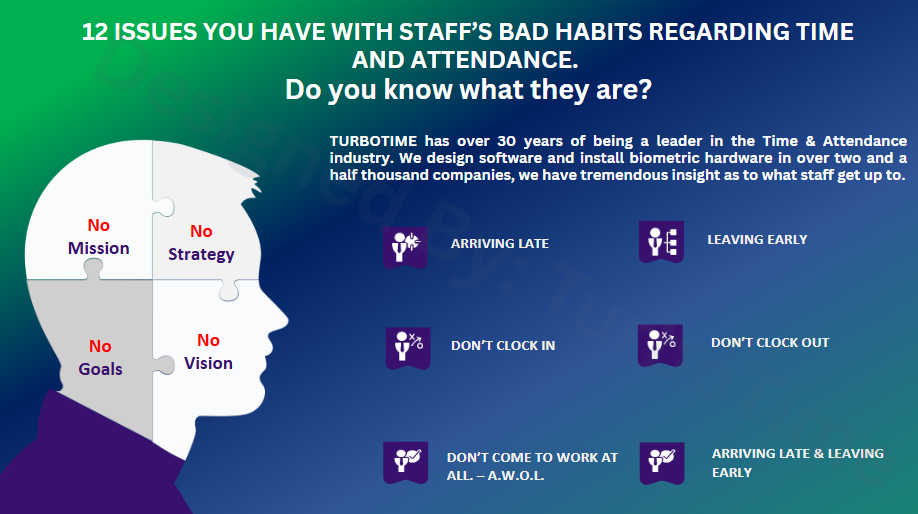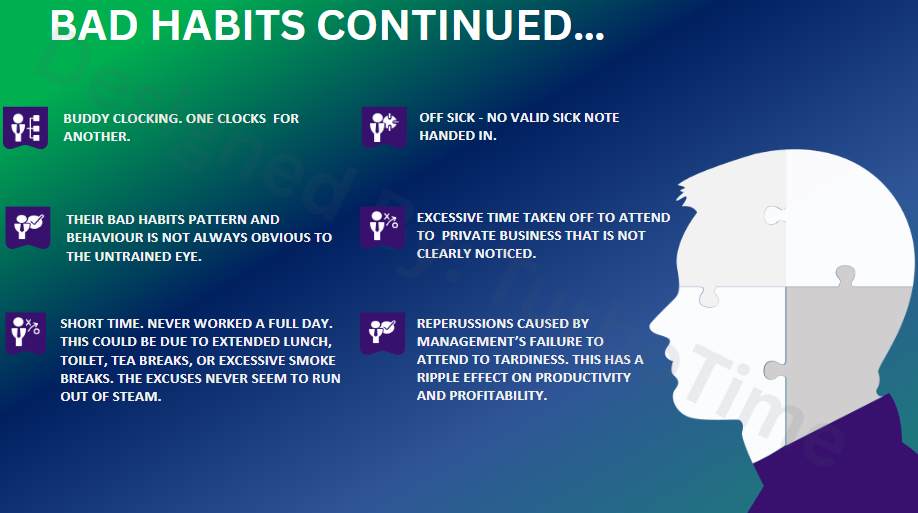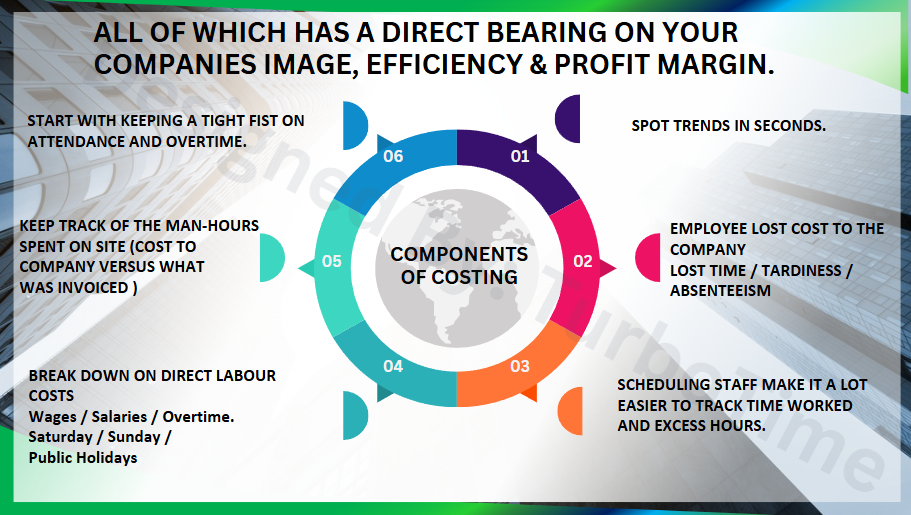12 ISSUES YOU HAVE WITH STAFF’S BAD HABITS REGARDING TIME AND ATTENDANCE.
Do you know what they are?
Bad time & attendance habits are common in many workplaces. At TURBOTIME, with over 30 years of experience as a leader in the Time & Attendance industry, we’ve seen firsthand how these habits impact businesses. We design attendance software and have installed biometric hardware in over two and a half thousand companies, giving us deep insight into how to identify and fix them.


Tardiness:
Employee tardiness is a frequent attendance problem that hurts team morale and overall productivity.
- Impact: When some employees are regularly late without facing consequences, it creates a sense of unfairness among the team. Staff members who consistently arrive on time may begin to feel frustrated or unappreciated, especially if their punctuality goes unnoticed. Over time, this can lead to resentment and disengagement, quietly damaging the overall work culture.
- Effect on Morale: The perception that latecomers are not held accountable can lower morale and create tension within the team. Punctual employees might feel their dedication isn’t valued, especially if they are expected to pick up the slack. This added pressure can reduce job satisfaction and motivation. When management overlooks fairness, loyalty, and punctuality, it sends the wrong message and can quietly chip away at productivity and team spirit.
Inefficient Time Tracking:
Inefficient or manual time tracking systems lead to errors and delays, making them a widespread attendance mistake.
- Impact: Using outdated or manual systems to track attendance causes errors, inaccuracies, and delays in payroll processing. It also complicates the process of identifying attendance trends and effectively monitoring employees’ punctuality and absenteeism.
- Effect on Morale: Inaccurate time tracking results in incorrect pay, leading to employee dissatisfaction and mistrust in management. When employees see their worked hours not accurately reflected in their compensation, they feel undervalued.
Poor Overtime Management:
Poor overtime management is a bad time & attendance habit that leads to employee burnout and unexpected labour costs.
- Impact: Poor oversight of overtime causes employees to work too many hours, leading to burnout and reduced productivity over time. If an employee gets injured on duty during excessive overtime, the legal consequences could be crippling.
Unauthorized overtime also drives up labour costs unnecessarily without a corresponding increase in output.
- Effect on Morale: Forcing employees to work excessive overtime without proper compensation or rest days makes them feel overworked and unappreciated, which negatively affects their morale and motivation. This can lead to higher absenteeism, especially on Fridays and Mondays, as employees struggle to balance work with personal responsibilities.
- The Basic Conditions of Employment Act outlines clear requirements for managing and compensating overtime, helping employers stay compliant and avoid labour disputes.
Inconsistent Policy Enforcement:
Applying attendance policies inconsistently is a bad attendance practice that breeds confusion and unfair treatment.
- Impact: Applying attendance policies inconsistently, such as rules about lateness, absenteeism, overtime, and leave requests, creates confusion and leads to unequal treatment.
- Effect on Morale: Inconsistent enforcement causes employees to perceive favoritism or unfair treatment, undermining management’s ability to maintain equality and enforce business rules effectively.This may foster a toxic work environment. Employees may become disengaged if they feel the rules don’t apply equally to everyone.
- According to the CCMA’s official disciplinary procedures, employers should implement consistent, documented processes when dealing with attendance issues to avoid bias and ensure compliance.
Insufficient Performance Monitoring:
Lack of proper monitoring of employee time and productivity allows bad attendance behaviours to persist unnoticed..
- Impact: Without adequate tools to track and measure productivity, companies struggle to identify underperforming employees. This results in missed opportunities for coaching and improvement, ultimately lowering overall productivity.
- Effect on Morale: High-performing employees feel frustrated when underperformers are not held accountable, creating a sense of inequity. This frustration lowers team morale and can lead to disengagement from top performers. This applies equally to both administrative and manufacturing staff.
CCMA Compliance Issues:
Neglecting attendance policy breaches and bad attendance habits risks costly CCMA disputes and legal penalties.
- Impact: Failure to comply with labour laws regarding attendance tracking, overtime, or breaks results in legal penalties and financial losses. This risk heightens in industries with strict regulatory requirements, leading to potential fines or lawsuits from past or current employees.
- Effect on Morale: When employees perceive that a company does not follow labour laws or protect their rights—such as failing to provide adequate breaks, compensating for overtime, or following the correct procedure for warning letters—trust in leadership erodes. This erosion of trust leads to low morale, reduced motivation, and higher turnover rates.Often, staff resign because they feel unmotivated or unappreciated. Replacing trained staff becomes an expensive endeavor and a topic all on its own.

Addressing bad time & attendance habits and related attendance issues boosts productivity, morale, and legal compliance.
